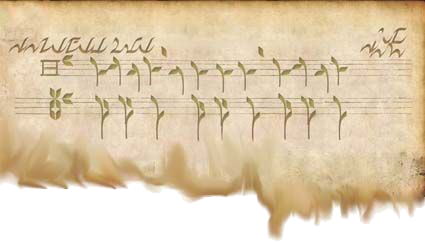Lara documents/Lara 007.002
Translated by turjan and Owehn
Kodotaygahnij, "I Was Loved"
- remin dotaygahn(1,2) kenen m'zoo(3) fahm b'rish
- keneet gahrahnotee rish m'zoo b'shem
- keneet birahntee rish mot leeahnioneet(4) ah set
- dovahtee rish ah(5)
- kooahntee rishsee dorahneet(6) te ah
- veelayoy kenen shin ril'gahth b'rifoon shem
- kodotaygahnij
- gormet ken rildil
- gormet tahgahm rildil tso shem
- kamto kenem(7)
- The woman I love is from me far to twenty.
- There are twenty oceans from me to you.
- There are twenty seas that separate us,
- Twenty worlds,
- Five hundred streams that range between.
- My soul is no longer able to remember you.
- I was loved.
- Now I am nothing.
- Now I know nothing of you.
- Where are you?
The translation provided above is my literal translation: a more English version would be the following:
- My love is so far from me!
- There are so many oceans between us.
- There are so many seas that separate us.
- So many worlds apart...
- So many streams that range between us.
- My soul can no longer remember you.
- I was loved,
- Now I am nothing.
- Now I know nothing of you.
- Where are you?
Translator's notes
(1) The central vowel in dot?gahn is a bit unreadable, but ay seems to fit rather nicely in context. –Owehn
(2) Here, a conjunction such as mot seems to have been omitted. The presence of do– seems to be consistent with other examples of this phenomenon, though we can't be sure when the omission is allowed or if it indicates a slightly different meaning. A similar construction appears in line 5, though mot is used in line 3. –Owehn
(3) In the text, this problematic word appears as m'zuh instead of m'zoo. Since there's no quantifier in front of zuh, and zoo fits better in context, I assume it was a typo. –Owehn
(4) The verb leeahnion seems to be related to the noun leeahnith from the Kenen Gor manifesto: in translating I assumed that both words had been derived from an adjective leeahnih, meaning something like "separate" or "divided". –Owehn
(5) I assume that this line is an abbreviation of the sentence (keneet) dovahtee rish (mot leeahnioneet) ah (set), by analogy to line 3. That pesky ah might be there to warn us that the direct object set "us" should be remembered in this line as well, and appears the same way at the end of line 5. –Owehn
(6) I'm guessing that the verb rahn here is related to the adjective rahnahl "various". The common thread here seems to be the idea that the streams range over a large region. –Owehn
(7) Pity there's no punctuation here – I'm reasonably certain that this last line is a question, though it's possible that it's a continuation of line 9: "I know nothing of you (e.g.) where you are." –Owehn
